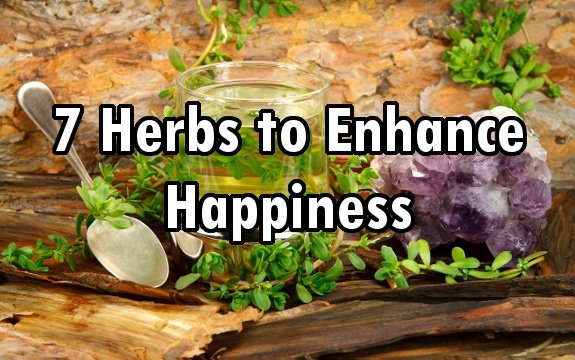7 Herbs to Greatly Enhance Happiness

 Harvard scientists, along with many others have suggested that being happier can also make you healthier, but they say fleeting positive emotions aren’t enough. We need to lower our stress levels and find healthful ways to mitigate depression, anxiety, and worry. Aside from pursuing activities that engage us fully (as suggested by the influential research by Mihaly Csikszentmihalyi) such as doing good for others and counting our blessings daily, there are some great herbs that can help to lessen insomnia, reduce nervousness, and essentially calm the nervous system – helping to increase the chance of feeling happiness.
Harvard scientists, along with many others have suggested that being happier can also make you healthier, but they say fleeting positive emotions aren’t enough. We need to lower our stress levels and find healthful ways to mitigate depression, anxiety, and worry. Aside from pursuing activities that engage us fully (as suggested by the influential research by Mihaly Csikszentmihalyi) such as doing good for others and counting our blessings daily, there are some great herbs that can help to lessen insomnia, reduce nervousness, and essentially calm the nervous system – helping to increase the chance of feeling happiness.
Here are 7 herbs that may help you feel better:
- 1. Lemon Balm (Melissa Officinalis) – This is a great, non-habit forming herb that is high in volatile oils (especially citronella) that have mild sedative effects and can reduce nervousness, including nervous headaches, depression, and insomnia. It can also help wounds heal faster and protect against insect bites. It has anti-viral properties, too, so it’s a great herb to keep in stock to boost the immune system.
- 2. Gotu Kola (Centella asiatica) – An antiseptic, antispasmodic, peripheral vasodilator, and nerving and relaxant, this herb is known for calming depressive episodes, strengthening cognitive function, and helping one deal with both mental and physical stress.
- 3. Brahmi (Bacopa Monnieri) – An Ayurvedic herb used for centuries, brahmi is known as a natural brain tonic and booster of well-being. It can enhance intellect and significantly increase memory, and in doses of 10 to 20 ml daily, one can enjoy its stress-relieving benefits.
- 4. St. John’s Wort (Hypericum perforatum) – This herb is often used to treat mild to moderate depression. It is especially helpful to patients who do not respond well to SSRI medication (selective serotonin reuptake inhibitors). This herb can limit the effectiveness of some prescription medications, though, so double check with your doctor before taking it. A 2009 systematic review of 29 international studies suggested that St. John’s Wort may be better than a placebo (an inactive substance that appears identical to the study substance) and as effective as standard prescription antidepressants for major depression of mild to moderate severity.
Read: 9 Healing Herbs You Need in Your Cabinet
- 5. Oat Straw (Avena sativa) – Not only can this herb effectively treat anxiety, it is also used to treat migraines, shingles, fatigue, and even epilepsy. This herb can be especially helpful in calming the nerves of those who are detoxing from drug or alcohol addiction, and can even help curb nicotine cravings.
- 6. Siberian Ginseng (Eleutherococcus senticosus) – This herb is a great replacement for those who have a coffee or caffeine addiction. It offers energy without the letdown that accompanies a caffeine cycle. Further, it’s an adaptogenic herb, so it ‘adapts’ to give your body what it needs the most. It can boost concentration and help manage environmental stress as well.
- 7. Golden Root (Rhodiola rosea) – Also called Arctic Root or Roseroot, golden root is considered a queen of adaptogenic herbs. As one blogger puts it, “[Golden root] allows us to regulate our immune, physiological and neurological responses to stress, allowing us to survive not only rough environmental/weather challenges, but also to adapt and adjust our often neurotic mental habits and crazy social/political climates as well.” The Russians use it to improve physical stamina and adapt to environmental stress. In Siberia, people still say, “Those who drink Rhodiola tea will live more than 100 years old.” The extract possesses positive mood enhancing and anti-stress properties with no detectable levels of toxicity. Golden root works by enhancing the body’s ability to make serotonin, dopamine, and other neurotransmitters that aid in happiness and stress-reduction.
